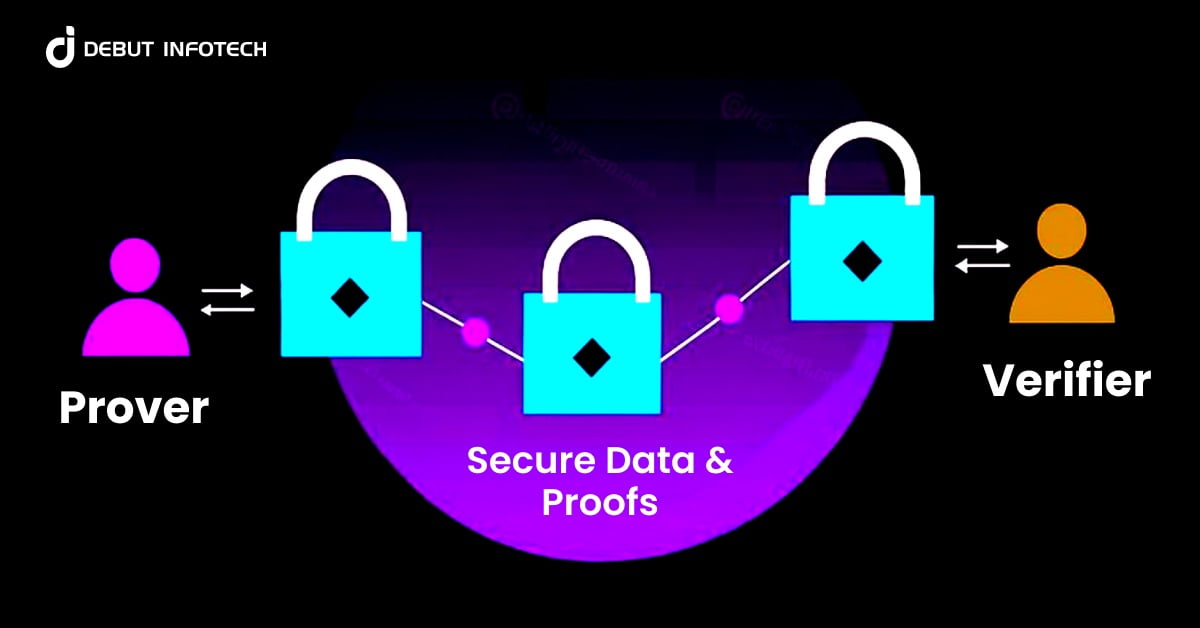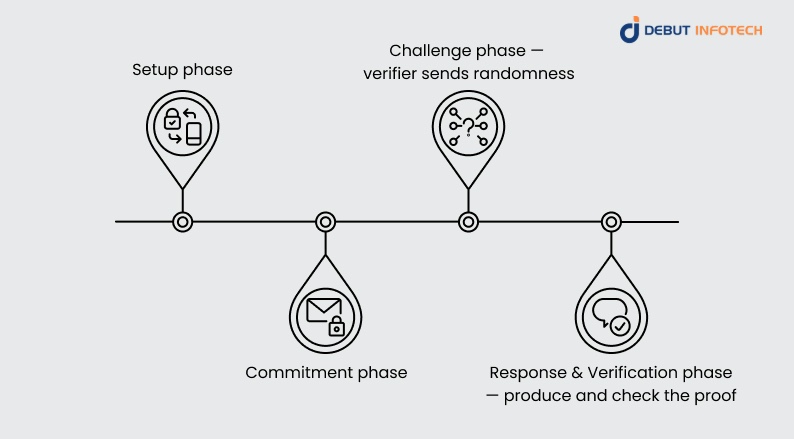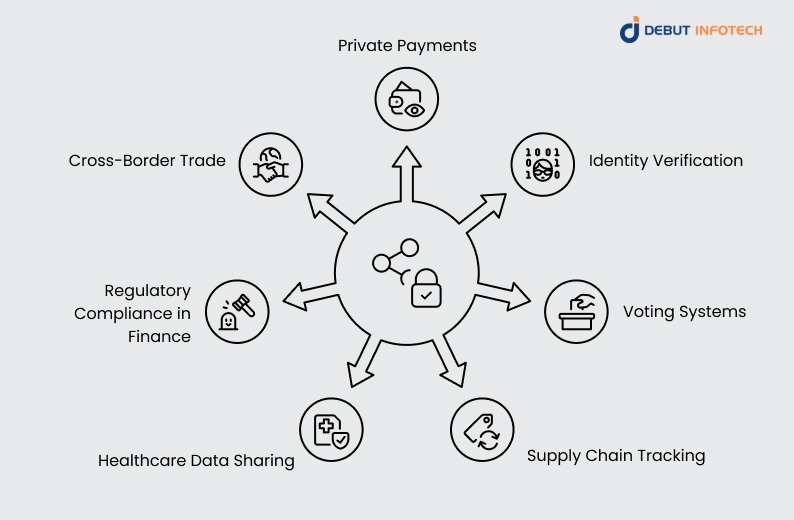Table of Contents
Home / Blog / Blockchain
How Do Zero-Knowledge Proofs Keep Blockchain Transactions Private?
August 14, 2025

August 14, 2025
Blockchain and supporting technologies have developed as cornerstones of trust and usability regarding privacy issues. Although transparency is central to devising the benefits of distributed ledger technology, information regarding specific industries, such as finance, healthcare, supply chain, and government, must be checked securely to prevent the revealing of sensitive information. This is where Zero-Knowledge Proofs in blockchain (ZKPs) come into play. A forward-thinking blockchain development company now considers ZKPs essential in building blockchain ecosystems that protect user confidentiality while maintaining verification integrity.
Zero-Knowledge Proofs (ZKPs) have revolutionized how data privacy is handled in blockchain systems. By allowing one party to prove they know specific information without revealing it, ZKPs provide a powerful mechanism for secure authentication, regulatory compliance, and private transactions. For organizations partnering with blockchain consultants or exploring enterprise blockchain development, understanding ZKPs is no longer optional—it’s a strategic imperative for staying competitive in a privacy-conscious market.
Building privacy-focused cryptocurrencies, enterprise blockchain solutions, or decentralized apps?
Debut Infotech’s blockchain consultants offer secure, scalable, and regulatory-ready solutions for privacy-focused cryptocurrencies, enterprise blockchain solutions, and next-gen decentralized apps, ensuring network transparency and data protection.
What Is Zero-Knowledge Proof?
At its core, a Zero-Knowledge Proof (ZKP) is a cryptographic protocol that enables one party—the “prover”—to convincingly demonstrate to another party—the “verifier”—that a given statement is true without revealing any other information beyond the fact that it is indeed true. This concept was introduced in the 1980s and has become a cornerstone of privacy-preserving digital interactions.
The “zero-knowledge” aspect means that no personal details, private keys, or transaction amounts are exposed during verification. The verifier does not get to know anything but the truth of the claim. This gives the ZKPs a special importance where privacy is paramount like in financial transactions and identity verification or when communicating some sensitive information.
Use on blockchain Using ZKPs on the blockchain will enable nodes to be able to trust transactions, credentials, or regulation of rules without releasing any underlying sensitive information. For example:
- A user can prove they have sufficient funds without revealing their account balance.
- A company can verify it meets regulatory requirements without disclosing proprietary business data.
This capability has profound implications for building decentralized apps (dApps) that balance security, privacy, and regulatory demands. Developers can design blockchain-based systems that are fully auditable yet do not compromise user confidentiality, paving the way for mainstream adoption in finance, healthcare, supply chains, and more.
What Is ZKP in Blockchain?
Now, “what is ZKP in blockchain?” This refers to integrating Zero-Knowledge Proof protocols directly into blockchain architectures to ensure transaction validation without revealing the data behind those transactions. This is a critical innovation for public and permissioned blockchains where transparency is essential, but certain information must remain private.
Purpose in Blockchain
The main goal of ZKPs in blockchain is to protect data confidentiality while maintaining trust across a distributed network. In traditional blockchain systems, every transaction detail is visible to all participants. While this guarantees transparency, it also exposes sensitive information. ZKPs solve this by letting participants prove validity without showing the actual data, thus combining privacy with blockchain’s inherent trust model.
Mechanics
ZKPs operate using advanced mathematical algorithms and cryptographic commitments. In essence:
- The prover generates a proof that they know a piece of information (e.g., a private key, a transaction detail) without revealing it.
- This proof is then broadcast to the network.
- Nodes verify the proof’s correctness without accessing the hidden information itself.
This process ensures that all blockchain participants can trust the transaction’s validity without compromising security or privacy.
Examples in Practice
Several privacy-focused blockchain projects already leverage ZKPs effectively:
- Zcash: Uses zk-SNARKs to hide transaction amounts and the identities of senders and receivers while keeping the ledger verifiable.
- Ethereum Layer 2 solutions: Utilize ZK rollups to batch and verify thousands of transactions off-chain with minimal on-chain data, boosting scalability while maintaining privacy.
- Enterprise blockchain development: Companies use ZKPs to ensure compliance (like verifying KYC) without sharing sensitive customer data across partners.
In short, ZKPs in blockchain redefine what it means to have both transparency and privacy in a decentralized system—offering a framework where trust does not come at the expense of confidentiality.
Zero Knowledge Proof in Blockchain Privacy
Zero Knowledge Proof in blockchain privacy solves one of the most critical challenges in public ledger systems: maintaining transparency for validation while protecting sensitive information.
How It Works in Privacy Applications:
- Hidden Transaction Data: Transaction values and participant identities are concealed from the public ledger.
- Selective Disclosure: Users can prove compliance with rules (e.g., KYC) without revealing personal identity details.
- Audit-Friendly Privacy: Regulators can access necessary data upon request without compromising global transparency.
For industries where confidentiality is paramount—banking, healthcare records, and legal agreements—ZKPs bridge the gap between privacy and blockchain’s inherent openness.
How Zero-Knowledge Proofs Work: Step-by-Step
Zero-knowledge proofs (ZKPs) involve a brief interaction between a prover and a verifier, with four stages of pursuit, each focusing on sub-issues and security attributes, and their details are crucial in understanding their nature.
Core properties every ZKP must satisfy
Before the steps, remember that a correct ZKP guarantees three properties:
- Completeness — if the claim is true and both parties follow the protocol, the verifier will be convinced.
- Soundness — a cheating prover cannot convince the verifier of a false claim except with negligible probability.
- Zero-knowledge — the verifier learns nothing beyond that the statement is true (no secret data leaks).

With that in mind, here are the classic phases:
1. Setup phase
- What happens: Prover and verifier agree on the cryptographic primitives, parameter sizes, and public values used by the protocol (often called public parameters or a common reference string).
- Choices matter: Some schemes require a “trusted setup” (a one-time ceremony that generates secret-to-be-destroyed parameters); others use transparent setups with no trust assumptions.
- Practical impact: Trusted setups can enable very short proofs and fast verification (e.g., some zk-SNARKs), but they introduce initial trust and audit complexity. Transparent schemes (e.g., zk-STARKs) avoid that tradeoff at the cost of larger proofs.
2. Commitment phase
- What happens: The prover creates a cryptographic commitment to their secret/witness. A commitment is like placing a secret into a sealed envelope: it binds the prover to a value but doesn’t reveal it.
- Why it’s used: Commitments prevent the prover from changing their story later (binding), and they hide the secret until the right moment (hiding).
- Typical primitives: Hash commitments, Pedersen commitments, or algebraic encodings — depending on the scheme.
3. Challenge phase — verifier sends randomness
- What happens: The verifier issues a (usually random) challenge to the prover. This forces the prover to demonstrate knowledge in a way that a fraudster can’t precompute.
- Interactive vs Non-Interactive:
- Interactive ZKPs: verifier and prover exchange multiple challenge/response rounds.
- Non-Interactive ZKPs (NIZKs): the challenge is derived deterministically (commonly via the Fiat-Shamir heuristic), so a single proof can be generated and verified offline — critical for blockchain use where many verifiers must validate the same proof.
- Security role: The challenge injects unpredictability and enforces soundness — a false prover cannot forge correct responses to unpredictable challenges.
4. Response & Verification phase — produce and check the proof
- Prover’s response: Using the previously committed values and the received challenge, the prover computes a response (the actual proof) that mathematically ties the commitment to the claim. This response is constructed so that it can be checked without revealing the secret.
- Verifier’s check: The verifier runs an efficient verification algorithm on the proof and the public statement. If the check passes, the verifier accepts; otherwise, it rejects.
- Practical tradeoff: Often the prover work (compute-time) is heavier than the verifier work — a desirable property for blockchains where many nodes must validate proofs quickly.
Types of Zero-Knowledge Proofs in Blockchain
Here are some types of zero knowledge proofs in blockchain:
1. Interactive ZKPs: In interactive systems, the verifier and prover communicate multiple times until the verifier is convinced.
2. Non-Interactive ZKPs (NIZKs): These allow proof generation and verification without constant back-and-forth communication, which is essential for blockchain platforms where scalability is crucial.
3. zk-SNARKs and zk-STARKs: These are
- zk-SNARKs: Small proof sizes, fast verification, but require a trusted setup.
- zk-STARKs: More transparent, scalable, and quantum-resistant, though with larger proof sizes.
Blockchain Use Cases for Zero-Knowledge Proofs

The integration of ZKPs has unlocked innovative blockchain use cases:
ZKPs in Blockchain Applications
Private Payments:
- Enables fully verifiable transactions with confidentiality.
- Ideal for privacy-focused cryptocurrencies, corporate treasury operations, and high-value B2B payments.
Identity Verification:
- Allows users to prove identity without revealing full identity.
- Implications for decentralized apps, regulatory compliance, and KYC processes.
Voting Systems:
- Enables cryptographical verification of votes without revealing the caster.
- Ensures election integrity while preserving voter anonymity.
Supply Chain Tracking:
- Confirms product origin, authenticity, and ethical sourcing without exposing sensitive business data.
Healthcare Data Sharing:
- Confirms patient eligibility for treatment or coverage without revealing detailed medical records.
Regulatory Compliance in Finance:
- Allows financial institutions to demonstrate compliance without revealing customer identities or sensitive internal data.
Cross-Border Trade:
- Verifies documents, contracts, or creditworthiness in global trade finance.
Advantages of Using ZKPs in Blockchain Development
- Enhanced Privacy: No need to reveal transaction details to the public ledger.
- Regulatory Compliance: Offers selective disclosure to meet KYC/AML requirements.
- Improved Security: Reduces the attack surface for malicious actors.
- Scalability: Particularly in NIZKs, transactions can be verified faster.
- Trustless Systems: Eliminates the need for third-party verification.
Challenges in Implementing ZKPs
While ZKPs offer significant advantages, they are not without hurdles:
- Computational Complexity: High resource requirements for proof generation and verification.
- Developer Expertise: A shortage of blockchain developers skilled in advanced cryptography.
- Integration Costs: Adding ZKPs may increase blockchain development cost in the short term.
- Standardization Gaps: Lack of universally accepted protocols across different blockchain platforms.
The Role of Blockchain Development Companies in ZKP Implementation
A skilled blockchain development company bridges the gap between theory and real-world application of ZKPs. Their expertise covers:
- Designing enterprise blockchain development projects that integrate ZKPs.
- Building decentralized apps (dApps) with advanced privacy layers.
- Reducing blockchain development cost through optimized tech stacks.
- Providing long-term support, audits, and upgrades.
Many leading blockchain development companies also act as blockchain consultants, guiding clients on when and how to integrate ZKPs for maximum ROI.
ZKP-Enhanced Enterprise Blockchain Development
For enterprises, ZKPs are a game-changer:
- Banking: Private yet compliant international transfers.
- Healthcare: Cross-hospital patient record verification without data leaks.
- Government: Transparent yet privacy-preserving citizen registries.
These solutions require in-depth collaboration with a blockchain development company to ensure compliance, scalability, and cost efficiency. Additionally, modern decentralized apps (dApps) leverage ZKPs to enable features like:
- Private Chat and Messaging: End-to-end encrypted conversations with verifiable proof of authenticity.
- Secure Marketplace Transactions: Buyers and sellers can confirm payment or product validity without revealing sensitive data.
- Token Transfers: Assets can be transferred with hidden values while ensuring compliance with platform rules.
Evaluating the Blockchain Development Cost for ZKP Projects
Several factors shape the blockchain development cost of implementing ZKPs:
- Complexity of Proofs: zk-STARK integration costs more than basic zk-SNARKs.
- Platform Choice: Ethereum-based ZKP solutions vs. custom blockchain platforms.
- Team Size and Skills: More experienced teams command higher rates but deliver faster, more secure solutions.
- Integration Requirements: Interfacing with legacy systems increases both time and cost.
Future Outlook: Zero-Knowledge Proofs in 2025 and Beyond
The demand for zero knowledge proofs in blockchain is projected to skyrocket as privacy concerns grow. Upcoming advancements will focus on:
- Post-Quantum Security: ZKPs that resist quantum computing threats.
- Faster Verification: Optimized algorithms for real-time applications.
- Interoperability: Cross-chain ZKP compatibility across major blockchain platforms.
Secure Your Competitive Edge with Zero-Knowledge Proofs
Our experts use ZKPs to create trustless, high-performance systems for enterprise blockchain development and decentralized apps, reducing costs, improving security, scalability, and user adoption.
Conclusion
Zero-knowledge proofs (ZKPs) are a key component of blockchain design, enabling organizations to integrate privacy-enhancing technologies into their systems. As privacy regulations become stricter and customer demands increase, ZKPs are no longer just a tool, but a permanent solution.
Whether you are exploring enterprise blockchain development, building decentralized apps (dApps), or seeking expert guidance from blockchain consultants, ZKPs offer a pathway to achieve transparency without sacrificing confidentiality. By partnering with an experienced blockchain development company, you can ensure your blockchain ecosystem is ready for the privacy-first future.
Frequently Asked Questions
Q. What is Zero-Knowledge Proof in blockchain privacy?
A. Zero knowledge proof (ZKP) is a cryptographic technique in blockchain privacy. It is used to support one party’s proof that they have something without disclosing it. ZKP is a key element of secure and privately implemented decentralised applications (dApps) in blockchain technology.
Q. What is ZKP in blockchain?
A. ZKP in blockchain refers to the integration of zero-knowledge proof protocols into systems, enabling trustless transaction verification without revealing private data. This is commonly used in privacy-focused cryptocurrencies, enterprise blockchain development, and other blockchain use cases requiring confidentiality and compliance.
Q. How do zero-knowledge proofs in blockchain work?
A. Zero-knowledge proofs in blockchain work through a structured protocol involving a prover and a verifier. The prover commits to a statement, receives a challenge from the verifier, and responds in a way that mathematically confirms their claim without revealing any underlying secrets. On blockchain platforms, this is often implemented as a non-interactive proof so multiple nodes can verify it quickly.
Q. Why should a blockchain development company use zero-knowledge proofs?
A. A blockchain development company might implement ZKPs to enhance data privacy, meet regulatory requirements, and enable secure verification in decentralized systems. ZKPs are ideal for applications such as identity verification, confidential transactions, private voting systems, and scalable layer-2 solutions — all while reducing blockchain development cost associated with handling sensitive data.
Q. What are some real-world blockchain use cases for ZKPs?
A. Some blockchain use cases include:
Privacy coins like Zcash hide transaction details while keeping the ledger auditable.
Decentralized finance (DeFi) apps need private trading or lending records.
Enterprise blockchain development for supply chain tracking without disclosing proprietary information.
KYC/AML compliance without storing sensitive personal data on-chain.
Privacy coins like Zcash hide transaction details while keeping the ledger auditable.
Decentralized finance (DeFi) apps need private trading or lending records.
Enterprise blockchain development for supply chain tracking without disclosing proprietary information.
KYC/AML compliance without storing sensitive personal data on-chain.
Q. How do zero-knowledge proofs impact decentralized apps (dApps)?
A. In decentralized apps (dApps), zero-knowledge proofs enable secure, trustless transactions that maintain user privacy. For example, a dApp could confirm a user’s age or credentials without storing personal data. This improves user trust, reduces data liability for the dApp operator, and aligns with global privacy regulations.
Q. Are zero-knowledge proofs expensive to implement in blockchain platforms?
A. The blockchain development cost for ZKPs varies depending on the complexity of the proof system, the chosen blockchain platforms, and the development team’s expertise. While generating proofs can be computationally intensive, verification is typically fast and cost-efficient on-chain. Many blockchain development companies optimize this using zk-SNARKs, zk-STARKs, or other proof systems tailored to the application.
Talk With Our Expert
Our Latest Insights
USA
Debut Infotech Global Services LLC
2102 Linden LN, Palatine, IL 60067
+1-708-515-4004
info@debutinfotech.com
UK
Debut Infotech Pvt Ltd
7 Pound Close, Yarnton, Oxfordshire, OX51QG
+44-770-304-0079
info@debutinfotech.com
Canada
Debut Infotech Pvt Ltd
326 Parkvale Drive, Kitchener, ON N2R1Y7
+1-708-515-4004
info@debutinfotech.com
INDIA
Debut Infotech Pvt Ltd
Sector 101-A, Plot No: I-42, IT City Rd, JLPL Industrial Area, Mohali, PB 140306
9888402396
info@debutinfotech.com



Leave a Comment